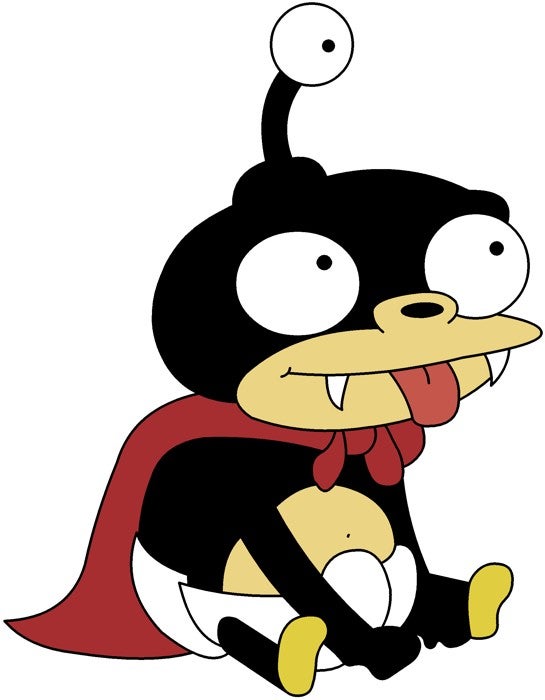- cross-posted to:
- memes@sopuli.xyz
- cross-posted to:
- memes@sopuli.xyz

Wait until you hear about languages where everything is gendered.
We’re currently debating, whether BürgerInnen, Bürger:innen or “Bürgerinnen und Bürger” is the proper way to address all citizens. This is not even about anything LGBTQ, it’s simply acknowledgement of the concept of non-male people (which is really hard for some conservatives).

I prefer the elimination of gender by using the participle because I think it’s easier to read and say, e.g. instead of Student:In you say Studierende (I guess also using the genderless plural of the participle, similar to the English concept). I’m not sure what the equivalent for Bürger would be though. Geborgene?

Why not just use the generic plural form (Bürger) as people always have? It has always been used for mixed groups so why shouldnt it continue to? And sometimes it doesnt even work (eg. for “Bauer”. The plurals would be “Bauern” and “Bäuerinnen”.

The problem people have with the Generischer Maskulinum is, that it is exactly that, the male plural form.

Grammatical genus is not the same as biological gender. Or do people that are biologically neither male nor female need a third plural form?

That would be another advantage if we had a form that clearly eliminates the gender.

Bürgende?

“Liebe Mitmenschen”, meistens ist es nicht nötig, nur diejenigen mit der Staatsbürgerschaft anzusprechen, sondern alle, die in dem Land leben

In French we have a similar problem. Currently the most popular form is “citoyen.ne.s” or “citoyen.nes” (besides the good old “citoyens” or “citoyennes et citoyens”), which sometimes gets rendered as a website by some text displayers (e.g. les habitant.es). It’s technically supposed to be a middle dot (citoyen·ne·s) but nobody has that on their keyboard (I literally had to copy-paste it from wikipedia) so people use the point instead. We used to use parentheses like “citoyen(ne)s” but these have vastly be replaced by the dots.

Interesting. In German typography we used to use lower quotation marks at the beginning of a quote and lower quotation marks at the end of a quote, both in handwriting and print:
„Amazing“
But the lower version isn’t found on the default QWERTZ keyboard layout so in personal digital communication (instant messages, emails, etc) especially you find double upper ones a lot:
“Amazing” or ‘Amazing’
The formal spelling rules haven’t been updated and you may still find the lower-upper vision in professional publications where the software adjusts the quotation marks according to a global setting. But most anything that is typed directly by a user will use the lazy lower-lower version.

We actually have the same issue with our « quotes » and accentuated capital letters in French, so « l’État » sometimes becomes “l’Etat”.

FYI, hold Alt and the press 0 1 8 3 then release Alt.

Doesn’t work on a phone/tablet

If it’s an Android and using Gboard you can go to the symbol tab and hold - to choose the · symbol.

Or, you know. Just Bürger, the generic masculinum. That all-inclusive. And it worked for a long time. It’s only because some snowflakes thought they needed something to complain about that we’re having this whole debate.

No it’s not and there’s scientific evidence. Studies have shown that female children will name career paths as their dream job less often if only the male version is shown to them, presumably because they think it’s not an option for them, as it’s perceived to be only possible for males to follow that path. Explicitly mentioning both genders suddenly makes girls also want to become doctors.
You might not like it, but there’s enough evidence to show that it has merit.

“scientific evidence”.
Just like the ‘scientific evidence’ that, for whatever reason, in countries where women are way less free than in the west, many more women go into STEM?
According to https://de.statista.com/statistik/daten/studie/200758/umfrage/entwicklung-der-anzahl-der-medizinstudenten/ since at least 2010 there are way many more women studying medicine than men.
You might not like it, but just because it’s “Die” Sonne And “Der” Mond, That Does not suddenly mean that the moon is male and the sun is female, just how “Der Schüler” Does not imply that they are male or female.
This whole discussion about grammatical gender is stupid and biased as fuck by “researchers” who come to the conclusion they want to come to. I work in academia myself, I know how much bullshit gets pushed through.
Don’t get me wrong, I support anyone being able to do whatever they want. Women can do engineering just as much as men can, same for medicine and everything else. The literal only upside that men have is - on average - higher physical strength. And that just means that a higher percentage of men is strong enough to do certain physical job than the percentage of women. Doesn’t mean the women strong enough to do that job do it any worse than men.

Statista is a website that steals data from everywhere, it’s not a source as they don’t do any research.

Der bre benutzt einfach “snowflakes” unironisch, was ist das, 2016?

Ja, Kumpel * in dud * in bro* sephine. Diese ganzen Gendersternverherrlicher innen brauchen einfach etwas worüber sie innen sich aufregen *innen könn *innen.
Ausserdem, bro *sephine, hast du mein Profil soweit durchgeschaut dass du rausgefunden hast dass ich männlich bin, oder hast du gerade mein Gender assumiert? Hier hättest du, um deinen eigenen Standards zu entsprechen, ein Genderneutrales Pronomen verwenden sollen, Bro *sephine.
Gerade nachgeschaut. In meinem Profil steht überhaupt nichts zu meinem Gender. Du hast also zwangsweise einfach mal so angenommen, dass ich ein Mann bin. Stimmt das mit deiner Ideologie überein?

Bro ist mir egal ob du den Stern nutzt oder nicht, du bist nur bissl cringe im Internet unterwegs und ich wollte mich drüber lustig machen.
Dass du da nen ganzen Paragrafen schreiben musstest, ist schon telling ne

women right? so annoying…

I wouldn’t mind a generic feminimum just as I don’t mind a generic masculinum. Grammatical gender doesn’t have anything to do with actual gender. It’s just a quirk of the language.

Portuguese! Even the f…ing objects are gendered!

Most things in Portuguese are gendered, yet we sometimes care fuck all about them (e.g: Sandwich is usually feminine, but it can be masculine depending on who you talk to).
Source: I’m Portuguese.

In brazil sandwich is male and we speak portuguese

Wrong, we speak brazilian

Sorry, i forget that we speak brazilian most of the time and spanish on the weekends

I’m brazilian too and my sandwich is also male! ♂️

Me, a german: Why would they not be gendered? At least you have only 2 genders

nO tHeRe ArE iNfInItE gEnDeRs!!!

“mmm this table looks quite feminine to me”

Spanish.

Is Bürger not just “citizens”

Male citizens.

In German:
Man = male (der Mann)
Woman = female (die Frau)
Boy = male (der Junge)
Girl = neutral (das Mädchen)
No idea why lol.
Also I’m learning French and everything has a gender but I don’t see any pattern to it at all. Pizza is female, books are male, a suitcase is female, hats are male and so on.
Also in French, the names of numbers go absolutely mental once you go above about 50. That’s got nothing to do with gender but I want to complain it whenever I can.

Girl = neutral (das Mädchen)
No idea why lol.
Mädchen is a diminutive, and all diminutives are grammatically neutral.
It’s the same in Dutch btw, and my girlfriend who is learning Dutch is frequently abusing this as a cheat code: whenever she doesn’t know the gender of a word, she’ll just use the diminutive and it will automatically be neutral.

I just might have just learned smth about my native language.

I think it’s das Mädchen because it’s a sort of diminutive (by use of chen). But it’s been a while since I studied German.

Correct, all diminutives are neuter in German. In this instance the base word is die Magd (historically the maiden, nowadays the maid), which is grammatically female.

In contrast to Mädchen the equivalent for Junge, „Jüngchen“, has not entered officialese and is seldomly used in colloquial language.
And it is also „das Jüngchen“.

Austrians: da buah

Afaik it comes from Magd, which is female lol.

related to maid, mädel. confer “maiden” in English

Aber was machen Sachen :o

Ah, yes the famous quatre-vingt-dix-neuf (commonly pronounced “quatre-vingt-deez-nuts”). Numbers are quite a mouthful in French. One of the reasons I erased it from my memory the moment I didn’t need it no more.

So french is just like portuguese, but in portuguese you normally know if something is male or female by the ending of the words (with a feel exceptions), for example pizza is female because ends with “a”

This is the same in french, the gender of words is generally determined by their ending. (Which is not pronounced.)

Good to know, french is on my list of languages that i wanna learn someday

No idea why lol.
This always confused me, even as a native speaker so I looked it up some. Ultimately it’s because modern German is the confluence of multiple older, historic languages one of which came from a tree with a strict male/female rule for nouns while the other one’s grammar defaulted to a neutral case.
As languages merge or adopt from others they often becomes a conjoined mess of multiple rules coexisting at the same time. A contemporary example is that in English the plural of a word is usually formed by attaching the suffix “s” to the singular form, aka house becomes houses. However there’s plenty of exceptions (mouse, mice) in particular if the words stem from a different language (octopus, octopi but nowadays octotuses is also acceptable). In that sense to people not privy to the etymology of words and who only study/learn the language per se there would be no perfectly accurate mechanism to predict the plural of a word.

Also bonus content:
singular: “das Mädchen” (neutral) - the girl
plural: “die Mädchen” (female) - the girls
So in the plural form you have to use a female article again, but the actual spelling of the word is unchanged. Go figure 🤷♂️ 🇩🇪.

The simple past of read is read, but you pronounce it like red. I assume ever language on earth has its quirks.

“Die” is always the plural article:
DAS Auto - DIE Autos / DER Baum - DIE Bäume / DIE Fliege - DIE Fliegen /

In plural every gender has the article “die”

Well at least it consistently unlogical. But wait: it actually depends on the grammatical case for example:
die Mädchen = the girls das Haus der Mädchen = the house of the girls // the girls’ house
So depending on context male, female, neutral articles are all used (der Mädchen, die Mädchen, das Mädchen) 🤷♂️

That’s not a male article, that’s the genitive plural article

It was to make the male seem more important. Even in English the word “woman” comes from “wife man”. Everything was about the pecking order in history. Gender bias was a major part of that.

That’s a misrepresentation of old English. Man used to be neutral, and was modified by were and wif respectively for man and woman. Wife comes from woman, not the other way around.

Ohh oui, french numbers I think they go mental after 69 ( ͡° ͜ʖ ͡°)
70: 60+10 (soixante-dix)
91: 4x20+11 (quatre-vingt-onze)
Why? No clue I am not french.

May or may not have some relation, but next to France/part of, lies the Basque country, where all numbers under 100 are base 20+10, except 11 and 19…
57: 2×20+10+7 (berr-ogei-ta-hama-zazpi)
79: 3×20+19 (hiru-r-ogei-ta-hemeretzi)
French (in Belgium, Switzerland, and former colonies) also allows simple base 10:
70: 70 (septante)
91: 90+1 (nonante-et-un)
…so the geographic location seems to have an impact.
And just next to it, in Spain, everything is base 10… except 11 to 15 change the order from n×10+m, into 1+10 to 5+10.
Italian does the same, except it’s 11 to 16… just like in French.
English has a hiccup with eleven and twelve, then goes to n-teen, before going base 10 with n×10+m above 20.
German does the same, except it goes to m+n×10 above 20.
Overall, 20 seems to be a magic number, France just seems to have mixed in different ways of using it.

Mädchen is neuter because it is diminuitive.
Das Häuschen Das Bäumchen Das Hügelchen
and so on. Diminuitive is always neuter, and Mädchen is diminuitive of Magd (or Maid, I forgot).

Reminds me of a famous quote from Danish humorist Jacob Haugaard:
French is an easy language to learn: a horse is called chevalle and it’s like that all the way

I’ll just leave this one for you :)

They obviously ran out of fingers and toes at fifty, so they traditionally never went any further.

My native language is genderless so I really dislike all the gendered grammar and words in different languages. English is very easy but in other cases when you start to have a male and a female version of each word which sometimes can be irregular and give you the clue that ohh yeah this should be male but noooo it’s female and in many cases there is just simply no logic behind them it is just the way they are.

German even has a neutral gender because two aren’t enough of a headache lol

Plus 4 cases which makes it so that there are 16 (Masc, Fem, Neutr, Plural X 4 cases) different ways of typing an article depending on the gender of the word and what the word is doing whereas in English this is all replaced by “The”. And don’t forget about declining the adjective and the noun in some cases.
Rant over.

And then like half of the articles are “der” and you just have to use context to figure out which one it is
Edit: I was randomly reminded of this graffiti I saw in Berlin:


So just get the whole country to use one “the”, simple 😎

English is barely gendered. In Slavic languages, as someone said, verbs are conjugated differently based on gender. In Serbian for instance, to say “I saw him”, you would say “Video sam ga” if you were a man, and “Videla sam ga” if you were a woman. In Arabic I think even more things vary based on gender, like “to you” has different forms based on whether “you” are a man or a woman. It might not be specifically that, but I distinctly recall Arabic using gender-based forms for something that Slavic languages don’t.
- balderdash ( @balderdash9@lemmy.zip ) 3•2 years ago
Hell, German has three genders. “The” is translated der, die or das depending on the noun

Yeah Arabic is pretty gendered

Honestly I wish English was less gendered than it is.
E.g. Nephew/Niece, why is there no proper gender-neutral one. This isn’t just for LGBTQ stuff, just seems silly to have everything gendered in general

See: Nibling
Nibbler?


Fair enough, learn a new thing each day haha
Altho I think it still says something about how we use English that I don’t think I’ve ever heard that used

Agree. Your point still stands. I just like that word.

Pibling (parent-sibling). Spanish speakers also have Titi (combining tio and Tia) and Italians (but NOT French) can use Zizi.
There’s also Unty and Auncle. I like Piblings though.

but NOT French
What happens if they try? Do they go to jail or is it just a fine?

Zizi is French slang for “penis”

Oh! Yeah, I guess calling your relatives that could become slightly problematic… 😂

The Académie Française shows up and threatens your family.

Nibling is a great word. But we need a neutral version of aunt or uncle.

Pibling!

My language doesn’t even have a word for sibling which has annoyed me every since I learned English 15 years ago.

There is: cousin

A cousin is your aunt/uncle’s kid, a niece/nephew is your sibling’s kid

The gender neutral for nephew/niece is nibling

We have a pretty good genderless pronoun, but have also decided that to not assign a gender to a person makes them not human. I’ve been hoping we’d challenge that preconception. Anyone can call me, “it”, anytime.

Based, I feel the same

I call animals “it” sometimes cause their sex is wildly irrelevant to me, and people get so offended lmao

yeah debates over Neo-pronouns are always a really tedious Anglo-centric thing. it’s not something that the majority of trans people worldwide are even able to care about

Yeah I feel some groups would have been better served getting on the gender abolition train rather than gender overspecialization; but it’s nicer to feel like you can pinpoint exactly where you belong than let go of the sillier social constructs in a world so invested in making them artificially important.

well artificial or not they are still important. it could be argued that our connection with reality itself is a social construct, at least insofar as we think in language and comprehend the world through language.
pronouns aren’t just jewels bedazzling our language. They’re a fundamental grammatical part of it. the language through which we understand the world only holds up with some basic underlying structures. so how we choose what words to use to stand in for something really shapes how we understand that thing.
It’s even more complicated by the fact that English pronouns have historically tended to be a closed class of words. the language has never readily coined or adopted new pronouns in the way we adopt new nouns and verbs (i.e., “google it”). that’s not to say it’s impossible for pronouns to become open-class and for neo-pronouns to work, but it’s fighting a battle against not just modern biases but also centuries (millenia?) of fundamental structure.

Interestingly, written Chinese does have a gendered ‘she’ pronoun, 她, but it’s pronounced the same as the male one, and it’s a recent invention meant specifically to improve compatibility with Western languages.
Also, if you want a sample of how this works in English, the narrator / main character of Ann Leckie’s “Ancillary” trilogy doesn’t understand gendered pronouns and constantly gets them mixed up.

This is true today but for a while in the 20th century 伊 was used for “she”

And there’s also 你 / 妳 that are used in some places or situations.

Gender is a myth invented by toilet companies to sell more toilets.

It’s a little known fact that men were created in 1925 by a marketing company tasked with selling urinals.

Ok but in writing you do, at least if you’re my college professors and want to make your students sad
他 third person singular, neutral 她 she 它 it (non-human, especially inanimate) 牠 it (animal) 祂 third person singular (divine)

Chinese also has words for he.

That’s literally the first one he mentions

Tbf he mentions neutral, but it’s both

In Finnish: hän = he/she. No need for gendered pronouns.
- PorkRollWobbly ( @ComradePorkRoll@lemmy.ml ) 2•2 years ago
Something something husband piece of shit husband?

Wow! TIL this. I was under the impression that all European languages have gendered pronouns.

Finnish is unrelated to nearly all other European languages
Swedish has more in common with Hindi than it does Finnish, despite being neighbours

I’ve stopped learning Chinese when I left the country. I’ve only had HSK 2, but man do I miss no conjugation, you ate an apple pie for breakfast this morning? Well “This morning breakfast I eat an apple pie”.
You already told it was this mornings breakfast with context.
This is something you really see when discovering another language that is not yours. I’m on Modern Speaking Arabic right now and I see it a lot
Technically it’s:
今天早上的早餐我吃了一个苹果派
Today morning breakfast I eat(了)an apple pie
You have to put the “了” to be correct
了 is kinda like past tense

Then you have Welsh where a lot of things are double affirmed in sentences removing ambiguity. even for the word yes you conjugate your reply as it depending on the quesrion they asked you.
Wyt. (Yes, you are. when asked as Am I?)
Ydw. (Yes, I am.)
Ydy. (Yes, he is.)
Ydy. (Yes, she is.)
Ydych. (Yes, you are. when asked as are We?)
Ydyn. (Yes, we are.)
Ydyn. (Yes, they are.)

How do you pronounce Ydw, Ydy and Ydych?

Oh boy, Welsh is fun. Y is sort of an UH sound, W is a OO sound and CH is A hard back of throat noise you make for the real scottish LOCH

Cries in HSK 0

doesn’t Chinese have pronouns though?
她 she 他 he 它 it
or am I missing something ?

They’re written differently, but pronounced the same.

I recently started very casually learning Chinese, this absolutely blew my mind along with the fact that verbs don’t have a billion different forms depending on time and the object of the sentence like all the other languages I know.

Finnish has ‘hän’ which is an ungendered pronoun. We use that for pets. Often we refer to people instead as ‘se’ which means ‘it’.

Me whose native language conjugates verbs and adjectives according to subject’s gender:
wasz język nie wymaga sprecyzowania płci podmiotu w każdym zdaniu?

Also Chinese kind of has gendered pronouns: 你 and 妳, both mean ‘you’ and are pronounced the same but the latter is used in writing to address females specifically. Though this is Taiwanese Mandarin-specific.
edit: 他她 as well obviously

Yeah Chinese isn’t a perfect example with the existence of 你妳 and 他她, etc. Though to be fair I’ve noticed native Chinese speakers get pretty confused by English pronouns and tend to mix them up since it’s mostly optional in Cheese.

Optional in cheese sounds like a lactose intolerant thing (my autocorrect tried putting in optimal and lacrosse, which was funny to me)

I was so confused when I saw your comment abou lactose intolerance and was wondering what it has to do with “optional in Chinese.” It took longer that I’d like to admit to realize that the original comment and yours said “cheese.”

How about Optimal Cheese Macross

For the lazy:
“Do you use gender pronouns?”
The “you” is plural btw. “You” in english was plural and “Thou” was singular. Idk why “Thou” disappeared. Just another English thing, I guess.

In French (and probably many other languages) first person plural is more polite. People in England started defaulting to “you” as it was a safer bet socially, and “thou” fell out of use.
English also used thorn (þ) before for “th” but printing presses didn’t, and substituted “y”, which I suspect contributed.

Wikipedia confirms, in particular on this page on the expression ye olde.

Well, when thou disappeared you took it’s place.

No you

Interestingly the you / thou distinction existed because of French / Latin influence (see the T-V distinction https://en.wikipedia.org/wiki/T–V_distinction). Thou was generally for addressing intimate / inferiors. English just drifted to using the more formal “you” across time and dropped the thou.

Oh gendered pronouns are fun in german.
Especially when combining the male and female version of a word to one gender neutral word.
For example doctor:
Arzt (male) + Ärztin (female) = ärzt’in (Singular) / ärzte’innen (Plural)

Are you sure? I think for plural it would be ärzt*innen, without the e, but i’m no expert

I mean there are no formal rules on how to form a gender neutral noun yet afaik, but what you stated is the form that would be used most commonly. Ärzte’innen is definitely nothing that I’ve seen so far, especially with the ’ character. Usually * or : is used

I tried using the * but then my text just went bold so yeah

Could be i wasn’t sure about that one

You’re right but tbh I think it’s so silly that using* stars has become the defacto politically correct way to address gendering in the first place. It’s such an eyesore

If you use it, I much prefer a :, like Arbeiter:innen.

It’s still dumb. When we’re at a point where we have to butcher our language with asterisks and colons to please Karens we’ve gotta admit that the language itself is heavily flawed.
Turns out English and Asian languages without gendered pronouns are simply superior

please Karens
what do you mean by that?
gotta admit that the language itself is heavily flawed
Are you proposing to get rid of the German language because it is flawed, instead of adapting it? First time i heard that idea

There’s also the Binnen-I, like ArbeiterInnen

English should absolutely do this you’d end up with some really cool words. Also because Jodorowsky was absolutely right - emperoratrix is a fucking kickass title

Emperoratrix sounds really clunky to me, -atrix is the feminine counterpart to -ator. Imperator, dominator, navigator, etc. I’m particularly fond of the overextension that is ‘alligatrix’ myself.

Fine fine, then Emperoress instead. It’s what the actual English translation of The Incal uses

Why not ‘Empress’, I wonder? Nothing actually wrong with any of the options, just rings strangely to my ears.

Because the entire point was that the character in question is genderless and this was the early 80s and also French so more modern gender neutral terms didn’t exist yet, and “let’s just smash the two gendered endings together” was his attempt at one (I’m guessing emperoratrix comes from a literal translation from French, where a female emperor is an imperatrice, and -trice is -trix in english, so imperatorice -> emperoratrix) The book also uses s/he as a pronoun instead of they.
I mean hey, it’s much more gender neutral than just defaulting to the masculine like say Le Guin did in left hand of darkness

Interesting!
